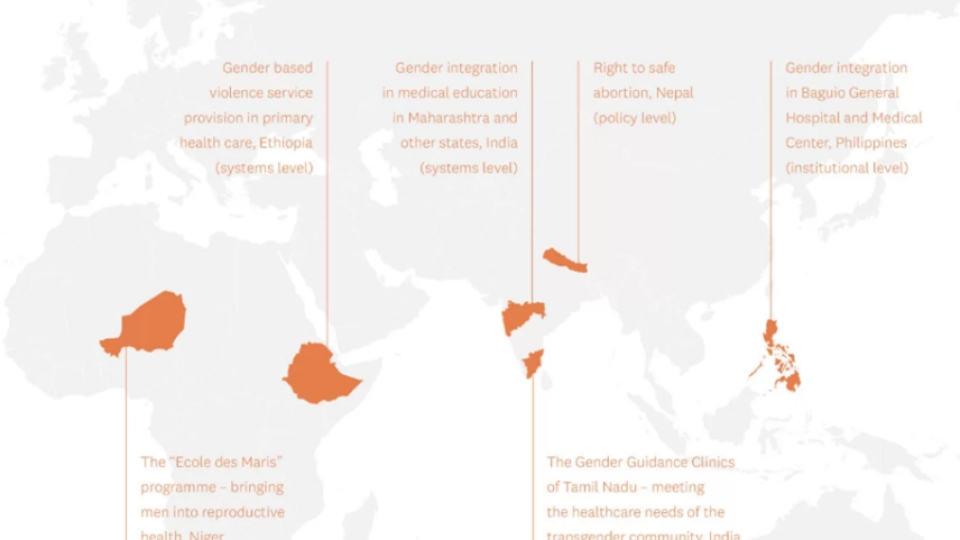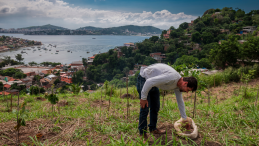Contributors: United Nations University International Institute for Global Health (UNU-IIGH), Ramalingaswami Centre on Equity and Social Determinants of Health Public Health Foundation India (RCESDH-PHFI), School of Public Health at the University of Western Cape (SoPH UWC) in South Africa
In the face context of multiple concurrent crises, national health systems are struggling to cope with cuts in funding, increasingly privatised healthcare, and widening health inequities. In this regard, governments play an important role in strengthening health systems through the provision of scaled and sustained health programmes. One important approach to strengthening health systems is through addressing gender inequalities within health programmes and policies. Gender integration involves identifying and then addressing gender inequalities during strategic planning, project design, implementation, and monitoring and evaluation. However, despite global commitments and available guidelines for gender integration, a substantial gap remains between intention and implementation. The current evidence-base largely focuses on the technical aspects of “what to do” to integrate gender but lacks practical insights on “how to do it” – particularly drawing from existing experiential evidence on promising approaches that have been scaled and sustained in diverse contexts and across different levels of the health system.
Building on prior work led by UNU-IIGH (the ‘What Works in Gender and Health in the UN’ study), which analysed 14 successful cases from a multilateral perspective at headquarter and regional level, there is an opportunity to analyse and learn from regional and national examples of successful gender integration in government health programmes.
To this effect, UNU-IIGH partnered with two leading regional public health institutes, the School of Public Health at the University of Western Cape (UWC-SoPH) in South Africa and Public Health Foundation of India through its Ramalingaswami Centre on Equity and Social Determinants of Health in India (RCESDH-PHFI), to co-create the Regional Promising Practices (RPP) project aimed at identifying and analysing promising cases of gender integration into government health programmes.
The specific objectives of the RPP projects were to:
Document and expand the practice-based evidence of policy-relevant factors, leading to successful gender integration in government health programmes at the regional or national levels in Africa, South Asia, and South-East Asia
Identify transferable lessons and inform current and future health programmes in the respective regions to integrate gender perspectives more effectively.
Project Approach
Each partner institute identified two or three experts to be part of the core RPP team and lead case study development in their respective regions. The core team convened regularly as part of a shared decision-making process to define the scope, criteria, and approach, and to analyse the case study findings. Additionally, ten advisors with extensive expertise in gender and/or health across Africa, South Asia, and Southeast Asia were approached to form three regional advisory groups, providing recommendations and insights on the methodology and selection of final case studies. Broadly, the project was carried out, as follows:
Identification and Selection of Case Studies
Three approaches were used to crowdsource a broad range of examples showcasing successful gender integration in government health programmes including 1) an open call, 2) desk review, and 3) direct contact with stakeholders. A total of 51 programmes were identified across all three regions, with themes ranging from gender-based violence, male involvement in health, COVID-related health service reforms, to gender-responsive vertical programmes. While promising, the screening process revealed that many of the 51 programs did not meet the criteria and were subsequently excluded. Ultimately, 7 programmes from Nepal, Ethiopia, Niger, the Philippines, and Timor Leste were shortlisted based on regional representation, diversity, and long-term sustainability. These programmes focused on gender mainstreaming in hospital systems, gender-responsive budgeting, male engagement, mainstreaming gender in primary health care, transgender health, and sexual and reproductive health. The case study in Timor Leste, however, was eventually excluded due to non-response from country partners.
Read about the case study identification and selection process
Access interactive dashboards featuring regional catalogues of the 51 programs
Case study data collection and policy dialogues
Once case studies were selected, each regional team collected data for their respective cases in cooperation with country partners. Data collection methods included literature and document reviews and in-depth interviews with key stakeholder to identify 1) outcomes achieved, 2) contextual factors that enabled gender integration in the programme or policy, 3) factors that catalysed change, and 4) mechanisms that supported the changes to be sustained over time.
Additionally, case-study specific policy dialogues were held with key government stakeholders and decision makers to discuss the nature and implications of the findings and identify opportunities for evidence-informed policy change.

Cross-case study analysis
In addition to individual case study analysis by regional teams, UNU-IIGH hosted a four-day in-person writing and analysis workshop with the core team and in-country research partners to consolidate case study findings, identify transferable lessons, and develop dissemination strategies.
Outcomes
This project culminated in 6 case studies, from Niger, Ethiopia, Nepal, India, and the Philippines, providing valuable lessons on successfully integrating gender into health programmes that have been scaled and sustained across diverse contexts including:
The key elements that drove the scale and sustainability of gender integration across six government health programmes spanning policy, systems, institutional, and community levels.
Transferable tactics that can help broker change to advance gender integration in health programmes at different levels.
Case Study Summary Series Launch
The Case Study Summary Reports were launched on 5 December 2024 as part of the Gender and Health Hub Virtual Forum. The launch event included an expert panel webinar discussing the case studies and inviting experts to unpack the ingredients that supported gender integration at national policy, institutional, and community levels in a subset of the case studies.
Download the presentations of the case study summary reports for more information:
Download the case study summary reports:
Capacity Strengthening
Drawing on regional case studies from South Asia and Southeast Asia, UNU-IIGH and PHFI collaborated with the Asian Development Bank Institute (ADBI) to develop and launch an e-learning course titled “Enhancing Gender Integration in Scaled and Sustained Government Health Programs: Lessons from Nepal, the Philippines, and India.” It is aimed at building the skills of policymakers and civil servants to improve gender integration in health within the South Asia and Southeast Asia regions.
Case Study Full Reports Launch
The full case study reports were launched on the 27th of March 2025 as part of a UNU-IIGH series on Advancing Gender Equality in Health: Expanding voices, evidence, and time horizons for change. The virtual event featured panel discussions with authors from the series and included insights from policy, funding, and civil society perspectives.
Watch the full event on YouTube
Download the full reports
Meeting the Healthcare Needs of the Transgender Community: The Gender Guidance Clinics of Tamil Nadu (India) -- India
Integrating Men into Reproductive Health: The École des Maris Programme in the Republic of the Niger – Niger
Gender Integration in Baguio General Hospital and Medical Center (Republic of the Philippines) – Philippines
Gender-Based Violence Service Provision in the Primary Healthcare System in Ethiopia – Ethiopia
Gender Integration in Medical Education in Maharashtra and Other States (India) -- India
Right to Safe Abortion in Nepal – Nepal
Conferences
Indian Association for Women’s Studies (IAWS) Kerala, India | September 7-10, 2023
The PHFI team attended the IAWS to present findings from the “Gender integration in medical education in Maharashtra and other states, India” case study.
Prince Mahidol Award Conference (PMAC) Bangkok, Thailand | January 25-27, 2024
Renu Khanna, a core member from the RCESDH-PHFI team, joined as a panellist to discuss how the RPP team intentionally adopted a decolonial and feminist approach to build a reflexive south-to-south collaborative research project.
The 8th Global Symposium on Health Systems Research (HSR) Nagasaki, Japan | November 18-22, 2024
Leveraging the case studies and networks, the core members of the RPP team partnered with other organizations to deliver one capacity-building session and two organized sessions, respectively:
Capacity Building for Gender Responsive Health Systems (19 November 2024)
Pushing Back on the Pushback: Upholding Rights to Sexual and Reproductive Health, Learning from Struggles for Safe Abortion (20 November 2024)
Queering health policy and systems: Conceptual and contextual starting points for integrating LGBTQI+ lived experiences into more just health systems (21 November 2024)
Zaida Orth, a member of the UNU-IIGH team, participated as a panellist in the Evidence 2 Action (E2A) Thematic Working Group (TWG) organised session, sharing insights from the RPP policy dialogues to improve evidence-based decision-making for advancing gender integration in health.
Asia-Pacific Ministerial Conference on the Beijing+30 Review Bangkok, Thailand | November 19-21, 2024
In the run-up to Beijing+30, UNU-IIGH, PHFI, and partners delivered a side event focusing on advancing gender equality in health within the region. The side event leveraged case studies from the RPP project, and other organisations as well as a collective call to action authored by heads of six UN agencies (UNAIDS, UNDP, UNFPA, UNICEF, UN Women, WHO), the UN High Commissioner for Human Rights, and the UN Special Rapporteur on the Right to Health, along with other distinguished experts and leaders on global health and rights.
The African Regional Community of Practice
The RPP project catalysed the formation of the African Regional Community of Practice (CoP) with partners from UNU-IIGH, SOPH and the African Union Commission on COVID-19 Gender and Stigmatisation Working group. The CoP is aimed at centring African evidence, expertise, initiatives and thought leadership to strengthen regional understanding, collective action and policy-relevant knowledge production for gender and health.


